Savitha, Sangeena, Sathana, Geetha, Rossi, Seethal and Srija are part of the transgender communities in Pondicherry and Tamil Nadu. They are called ‘Thirunangais’, or ‘daughters of God’. India recognised the existence of a third gender in 2014 and decriminalised homosexuality four years later. These advances seemed to suggest that Indian society was on the cusp of change, albeit gradual, but the day-to-day realities still faced by many Thirunangais tell a very different story. Shunned by their families, often beaten, raped and excluded from the labour market, they have to rely on begging, sex work and the bonds of solidarity that unite their community to survive. They are feared and revered in equal measure, ascribed as they are by Hinduism with powers of benediction, healing and fertility. They occupy a paradoxical position that is a source of fascination for many.
As a French photojournalist of Indian origin, Jennifer Carlos says she has been intrigued since childhood by the beauty of the Thirunangais and the courage with which they defy expectations in one of the world’s most patriarchal and conservative societies. In September 2021, she decided to go and meet them and immerse herself in their community for six months, to bear witness to their marginalised lives. The women agreed to be photographed as they went about their day-to-day activities, caught between hardships and hopes of a better future.
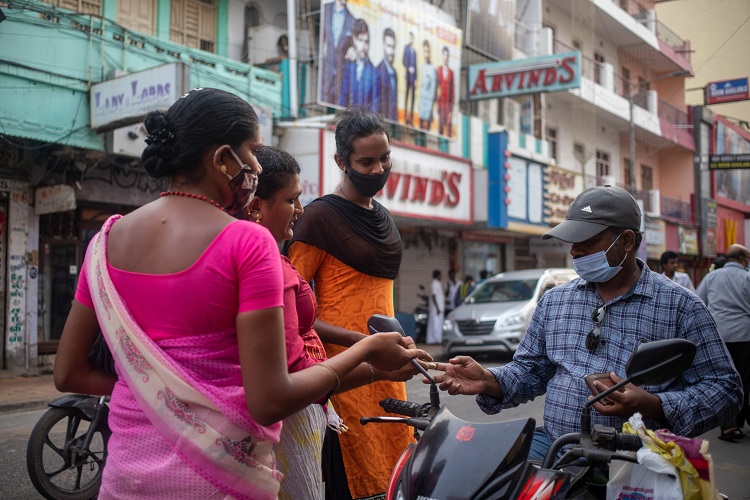
“Give me some money and you will be blessed!” Savitha, Sangeena and Sathana do not go unnoticed as they call out to passers-by in the bustling streets of Pondicherry. Some of the men they encounter look away, while others approach them to slip a note in their hands.
Transgender women begging and blessing passers-by in the hope of getting some small change is an everyday sight on the streets of Tamil Nadu’s major cities. Taller and more provocative than the other saried figures, they are called ‘Thirunangais’. This is the term used in South India to refer to people assigned as male but who do not identify as such, more commonly known as ‘Hijras’ in the north of the country.
Criminalised by the British colonialists in India at the end of the 19th century, the stigmatisation of eunuchs and transgender people continued into the post-colonial era. Once employed by the Maharajas to guard harems, they now live on the margins of society, despite the Indian Supreme Court’s recognition of a ‘third gender’ in 2014.
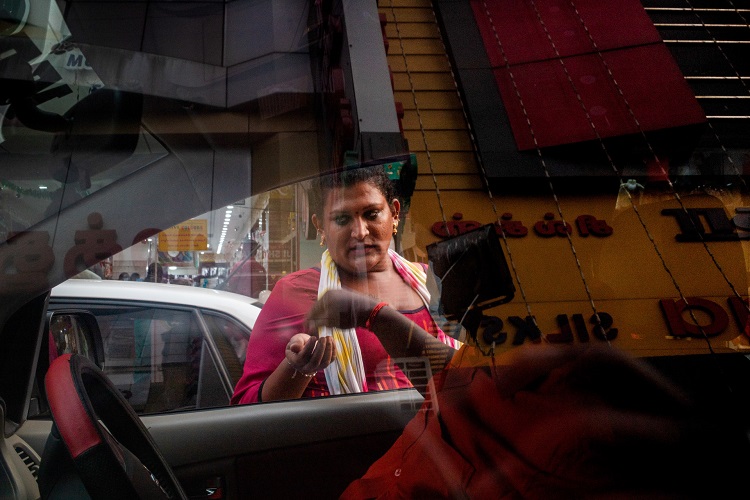
Thirty-year-old Savitha has never been able to find a job, despite having graduated as a medical laboratory technician. “Even if you don’t work, you are beautiful, and if you can satisfy my needs that will be enough,” the head of a laboratory told her during a job interview. She has been begging on the streets of Pondicherry every day since she was 18. It brings her around 300 to 500 rupees (between €4 to €6) a day.
Savitha has tried and failed to find work on many occasions. She is one of many. Although often qualified, the members of this community are not given the opportunity to put their skills to work. Society assigns them a position that they simply cannot escape. It was the British colonialists that turned them into pariahs. Article 377 of the Indian Penal Code, criminalising “unnatural” consensual sexual conduct and classifying transgender people as a “criminal tribe”, remained in force until 2018.
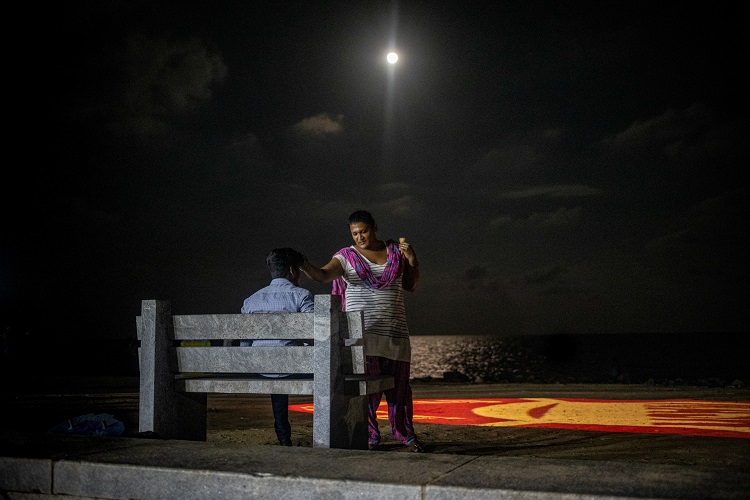
In the evening, Savitha blesses a man on the seafront in Pondicherry in exchange for 15 rupees (€0.20). According to Hindu religious belief, transgender people are descendants of the fertility goddess, Bahuchara Mata, who gives them the power to protect and to heal, but also to cast spells.
They are both rejected and respected for their power of benediction, known as ‘shirvan’. This is achieved through the choice to prioritise spiritual life over sexual life, and may involve emasculation. ‘Nirvan’, as this ritual is called, refers to nirvana – a state of serenity and the absence of desire. Despite living on the margins of society, they nonetheless have a strong presence in the cultural imaginary.
Thirunangais and Hijras are therefore faced with a paradox laden with fascination, between a position of divine purity and impurity, given their reliance on begging and sex work to make a living.
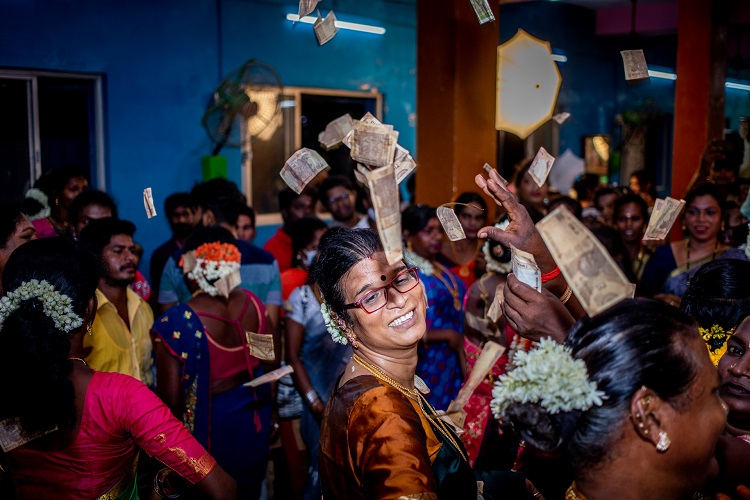
A nirvan ceremony celebrating the vaginoplasty of 11 members of the community in Pondicherry in October 2021. The head of the local community, 45-year-old Seethal (in the foreground) asks each participant to bring a new sari and 3,500 rupees (€43). During the evening, the participants dance while throwing in the air some of the money collected for the “newborns”, as they are called by the community.
Seethal started to question her identity while studying at university. Confused, she made an appointment with a doctor in the hope of finding some answers. The doctor, using the pretext of wanting to examine her, raped her. Later, when she finally decided to tell her family about her transgender identity, her parents tried to burn her by dousing her with gasoline. She managed to escape just in time.
Some families choose to remain silent and in denial, making their child carry the burden of being “abnormal”. Seethal’s hope for the future is that the process of change will start within the family. “They have to accept us, because we don’t belong to them; our bodies belong to us.” Most of the adolescents who have identity issues run away from their families and end up on the streets. They find themselves having to build a new identity, in a country where individual identity is based on the family structure, and the institution of marriage.
After leaving university, Seethal soon realised the extent of the abuse suffered by members of the LGBT+ community. One night, after witnessing a transgender sex worker being assaulted by two customers who were refusing to pay, she realised that there were other LGBT+ people in Pondicherry and that they had no one to turn to for protection. She decided, with the Sahodaran Community Oriented Health Development (SCHOD) Society, to start organising group discussions in a secure space, creating a private and safe environment for people like herself.
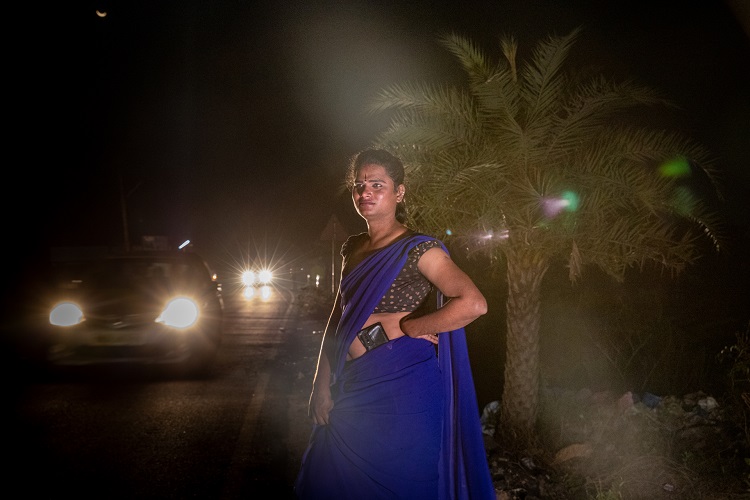
Twenty-seven-year-old Rossi does sex work on Semmandalam Kurinjipadi Avenue in Cuddalore, as seen here in February 2022. Prostitution is illegal, but police corruption remains rife and takes many forms for these sex workers, including the payment of bribes.
The Supreme Court has declared that transgender people should be treated as a third gender category with specific rights in terms of access to education and employment. In 2017, another Supreme Court decision stated that privacy is a fundamental right and that the sexual orientation of any individual should be confidential. These rulings offer a basis for contesting the socioeconomic discrimination suffered by transgender people, especially in the area of health care. Despite these advances, their day-to-day lives have not changed and they cannot always turn to India’s corrupt authorities to complain.
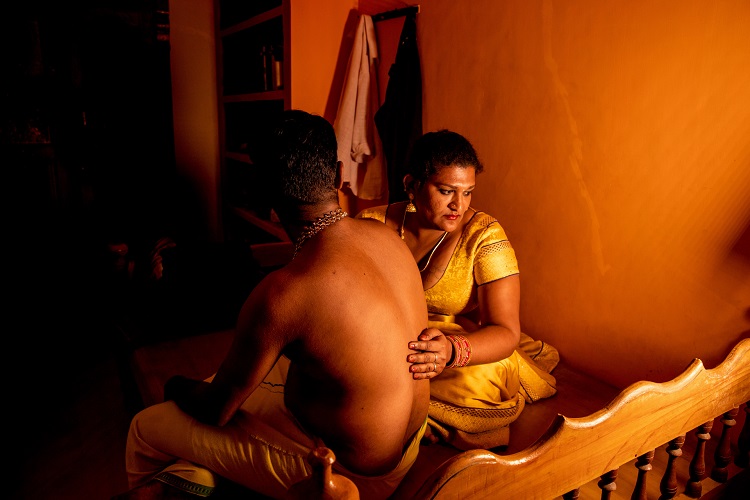
Savitha has followed this regular customer to Madukkarai, about 400 kilometres west of Pondicherry: “He treats me well; he’s kind to me. So I charge him less when I need money quickly.” On this occasion, she asked him for just 300 rupees (€4), well below her usual rate of 1,500 rupees (€18).
Transgender women rarely manage to develop a healthy romantic relationship, as they are seen as sex objects. Women who make a living from sex work are even more likely to be victims of violence, not only in public places, police stations and prisons, but also in their own homes. An estimated 70 per cent of transgender people in India are sex workers. HIV/AIDS is taking a heavy toll, with infection rates among this population group estimated to be a hundred times higher than the national average.
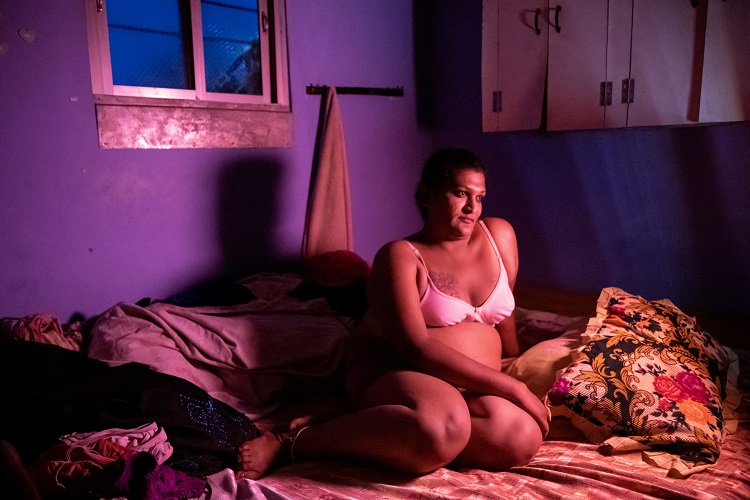
Savitha dreams of changing her life and quitting sex work: “My deepest desire is that people stop being afraid of transgender people. After all, I was a man and I have become a woman, so I can understand both; I have feelings too. I want people to stop seeing us as if we were animals or mentally ill.”
For many Thirunangais, being forced to live in a community is not always easy. They are caught between taboos, labels and their own aspirations. “I want people to understand that we are individuals who want – just like everyone else – to live our lives and be independent,” says Savitha. They often have to live with major traumas, which are specific to each transgender woman’s story, but they develop a resilience that enables them to remain hopeful and keep battling on, day after day.














